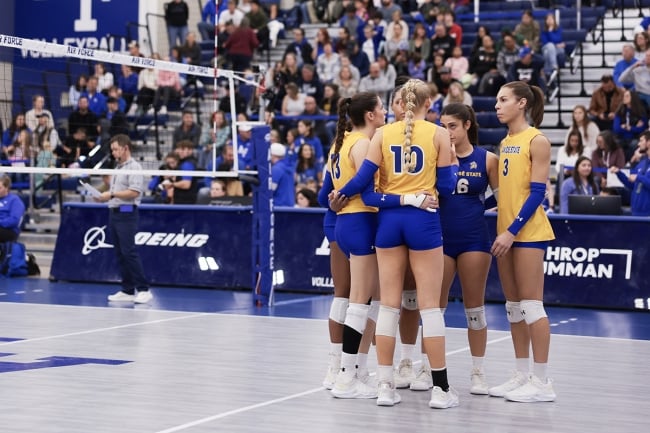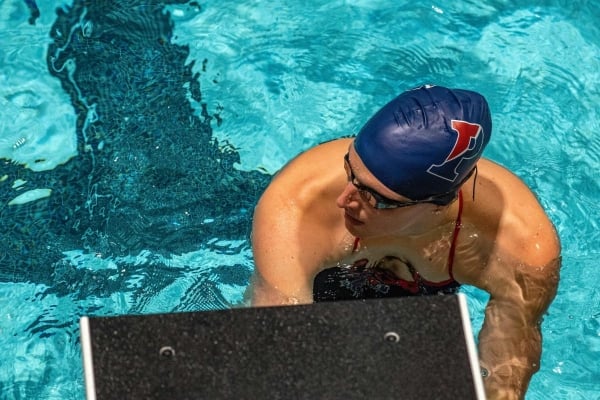You have /5 articles left.
Sign up for a free account or log in.

The SJSU Spartans huddle during a regular-season game against the Colorado State Rams on Oct. 19.
Andrew Wevers/Getty Images
San José State University’s women’s volleyball season ended not with a bang but a whimper. The team lost to Colorado State University in the Mountain West Conference championship game on Nov. 30, after Boise State University’s team refused to play SJSU in a semifinal game and gave up their place in the tournament.
It was the third time Boise State declined to play SJSU this season; four other teams also forfeited games against the Spartans, seemingly in opposition to one SJSU player who conservative media outlets have reported is transgender. The first article on the subject, published by Reduxx, which describes itself as a feminist news site, claimed that the athlete and the institution had withheld her biological sex from her teammates.
(Like many mainstream news outlets, including ESPN and The New York Times, Inside Higher Ed is declining to publish the player’s name, as she hasn’t publicly spoken about the issue and the university has never officially confirmed she is transgender.)
While not all the teams that forfeited explicitly cited the student as their reason, several members of the University of Nevada at Reno team were vocal about not wanting to play against a trans woman. They held a “Women’s Sports Are for Women Only” rally on the day they were scheduled to play SJSU, where they railed against trans-inclusive sports policies and against their institution for allegedly trying to force them to play SJSU.
“My question to the NCAA and the Mountain West Conference is, ‘How many young women will have to be beaten or see their friends beaten up … before enough is enough?’ Men do not belong in women’s sports. If you are born a male, you do not belong in women’s sports,” one UNR player said at the event, according to Nevada Sports Net.
Conservative politicians and pundits have strongly supported the boycotting teams. After Boise State’s first forfeit, Idaho governor Brad Little, who spearheaded a first-of-its-kind state law prohibiting trans athletes from playing on the team that aligns with their gender identity, celebrated the decision on X, writing, “We need to ensure player safety for all of our female athletes and continue the fight for fairness in women’s sports.”
Brooke Slusser, the Spartans’ co-captain, has also spoken out repeatedly against the teammate in question, whom she and four other players lived with in 2023. According to a recent article in The Telegraph, a U.K. newspaper, she commended the teams that had boycotted hers, saying, “It’s so admirable. As an athlete, the first thing you do is go out and play, and I think it’s amazing that these women are able to stand up for something they believe in.”
The Trans Athletics Debate
The controversy surrounding the SJSU volleyball team is the most explosive conflict over trans women’s participation in college athletics since 2022, when Penn swimmer Lia Thomas drew national scrutiny after winning the NCAA women’s 500-meter freestyle championship. Though the debate has been quieter in the intervening years, it has continued to rage in legislatures and board meetings around the country, especially as the vitriol against trans people in general has grown, leading to bans on trans people using restrooms that align with their gender identity and on trans youth’s access to gender-affirming medical care.
Currently, 22 states have passed bans or restrictions on trans athletes at the postsecondary level, while a few more have instituted bans only for grades K-12 or 5-12. Athletic associations, the governing bodies for college sports—of which the NCAA is the biggest by far—have also grappled with questions about whether to exclude trans women from women’s teams. (In general, it’s less controversial for trans men to play on men’s teams. While most of these laws prohibit trans athletes from playing on their preferred teams across the board, a handful allow trans men to play on men’s teams but disallow trans women from playing on women’s teams.)
It’s a relatively recent issue; Idaho was the first state to pass a trans athlete ban in 2020, although a federal judge issued an injunction shortly after it was passed, blocking it from being enforced for years. Since then, transgender people’s rights have become a political flash point, with sports often serving as a proxy for broader conservative antipathy toward the trans community.
“The issue of sports was something that conservative anti-trans forces latched onto as a real winning issue,” said G. Samantha Rosenthal, an associate professor of history at Roanoke College who has written about how the definitions of sex and gender have changed over time. “My understanding is the sports issue is seen by anti-trans opponents as the most persuasive one for broad sympathy.”
Indeed, on the campaign trail, President-elect Trump mentioned trans people on several occasions, including making a specific reference to SJSU in October.
“Women playing men … we stop it. We stop it. We absolutely stop it. You can’t have it,” he said during a town hall on the Fox News Channel show The Faulkner Focus, according to the Los Angeles Times. “You just ban it. The president bans it. You just don’t let it happen.”
Governing Bodies Adjust Rules
Until 2022, NCAA rules stated that trans women could not play on women’s teams unless they’d been on feminizing hormone therapy for at least a year.
But in 2022, the NCAA decided that trans athletes would follow the rules set by their sport’s national or international governing body, which would determine whether a trans woman could play on a women’s sports team by, in most cases, ensuring her testosterone levels were below a certain threshold.
“The resulting sport-by-sport approach preserves opportunity for transgender student-athletes while balancing fairness, inclusion and safety for all who compete,” the NCAA policy states.
The NCAA has faced backlash from both sides for this approach. Anti-trans advocates argue that a blanket ban is the only way to prevent the harms they say come from trans women playing on women’s sports teams, including cis women athletes losing opportunities to trans women, competing against athletes they believe have a natural advantage and sharing locker rooms and other close quarters with trans women.
“There is no human on earth that changes sex; it’s not possible. So, you have women being told, ‘You must undress next to a man,’” Kim Jones, the co-founder of the Independent Council on Women’s Sports, told Inside Higher Ed.
The two-and-a-half-year-old organization is currently funding a large class action lawsuit against the NCAA, demanding that the governing body change its rules to prevent trans women from competing in women’s sports. The lawsuit argues that the association’s transgender athlete policy violates Title IX; if athletes assigned male at birth are allowed to play on women’s sports teams and win competitions, they say, women are not truly being given equal access to sports as promised under Title IX.
Activists for trans athletes’ rights, meanwhile, argue that the NCAA changed its policy to give jurisdiction to individual sports’ governing bodies in response to political pressure. A group of hundreds of current and former collegiate and professional athletes sent a letter to the NCAA earlier this year encouraging the organization to stand by its trans athletes and ignore calls to disallow them from playing on the team they identify with.

“As athletes, we know firsthand that sport has the power to change lives,” the letter said. “Allowing transgender athletes within the NCAA to participate in the sports they love as who they truly are alongside their teammates fulfills the true spirit of Olympism we all ascribe to. Sport should never be for a select few. We call on you to be on the right side of history and affirm that sport is truly for us all. Do not ban transgender women from NCAA women’s sports.”
One small governing body, the National Association of Intercollegiate Athletics, which includes 241 colleges, changed its policy earlier this year to mandate that only students whose “biological sex” is female may play on women’s teams. While some celebrated the decision, it prompted at least one institution, California State University Maritime Academy, to leave the association altogether.
In a statement, Cal Maritime interim president Michael J. Dumont said the NAIA’s stance contradicted statewide and institutional nondiscrimination policies.
Fairness and Safety
Arguments over trans women in sports have long centered on the complex question of whether trans women athletes have natural advantages over cis women. Experts say very little research exists on the topic; Anna Posbergh, an assistant professor in the Department of Sport Management at Florida State University, said she knows of only two studies that specifically looked at trans women athletes, both of which were completed by researcher Joanna Harper. The more recent study, which was commissioned by the International Olympic Committee and published in April, indicated that trans women maintained certain advantages over cis women, such as grip strength, but demonstrated worse lung function and lower-body power, though the sample size was relatively small.
Posbergh noted that the evidence that opponents of trans women athletes often cite to prove their performance advantages is often misconstrued or taken out of context, and usually drawn from research that does not focus on athletes specifically.
“They’ve gone into the medical research and found one sentence,” she said. “There is barely any research that concretely says that trans women maintain their performative advantage after transitioning.”
But the narrative surrounding trans women in sports has also changed significantly in the two years since Thomas made headlines. At that time, the primary question seemed to be whether it was fair for trans women to compete against cis women. Now anti-trans activists seem more focused on issues of safety and comfort than fairness; a lawsuit against the Mountain West Conference, filed by Slusser and several other athletes who competed against the allegedly trans SJSU player, argued, among other things, that the player could have injured them on the court.
In the lawsuit, which was also backed by Jones’s organization, one of the plaintiffs said they and their teammates worried that “all it would take for them to have to retire and perhaps be permanently injured would be for a single” attack—the term in volleyball for a hit intended to score a point—by the allegedly trans athlete “to hit them in the head.”
(The lawsuit sought an emergency injunction to change the conference’s rules on trans players just before last month’s tournament began, in an effort to prevent the SJSU player from participating. A federal judge denied the request, arguing that the conference’s trans player policy had been consistent for two years, so there were no grounds for plaintiffs to file for emergency relief so close to the beginning of the tournament.)
Volleyball injuries—and sports injuries broadly—are common; from 2013 to 2022, young people between 10 and 19 sustained about 56,400 head and neck injuries playing volleyball, according to recent research. But the only indication that the allegedly trans SJSU player has directly caused injury came from the original Reduxx article, which cited an anonymous teammate’s mother who claimed her daughter has sustained “more physical injuries and strains than she ever had before in her volleyball career, and was constantly icing and rubbing her arms after blocking shots” from the player.
“When we think about sport, sport is an incredibly violent act to begin with,” Posbergh said. “Just look at the NFL—every week you have concussions.”
In their efforts to pass trans athlete bans, legislators have also shifted their rhetoric to talk more about safety. Alabama senator Tommy Tuberville, a former Auburn University football coach and the author of a federal bill that would prevent certain sports governing bodies from permitting individuals assigned male at birth to participate in women’s sports, said in a press conference last February that current regulations endanger women.
“So now, people are going to pay to watch men punch women for sport,” Tuberville is quoted as saying in 1819 News, a conservative news outlet covering the state of Alabama. “It’s disgusting, but that’s where we are as a society now.”
Tuberville’s legislation, which hasn’t progressed out of the Senate Committee on Commerce, Science and Transportation, is one of three recent federal bills proposed to end trans women’s athletic participation. In 2023, the Protection of Women and Girls in Sports Act and the Save Women’s Sports Act, both of which aimed to prevent all schools and postsecondary institutions that receive federal funding from allowing individuals assigned male at birth to play on women’s teams, were introduced; the former passed the House but never progressed further, and the latter did not make it out of committee.
The appetite for federal anti-trans legislation is growing slowly but surely—and is likely to gain momentum under a Republican trifecta after Trump is inaugurated next month. At the same time, state-level legislation continues to find success, with both Ohio and New Hampshire passing restrictive trans athlete bills in 2024, though New Hampshire’s law is for grades 5-12 only.
At least one more state is likely to pass a ban next year: Georgia, which was the site of the NCAA swimming championship meet where Thomas won nearly three years ago. The state’s lieutenant governor, Burt Jones, is committed to getting the legislation passed.
“Protecting women’s sports and their rights will remain a priority in the Georgia Senate as we head into the 2025 Legislative Session,” the lieutenant governor told Inside Higher Ed in an emailed statement. “The Senate continues to lead on efforts to protect women’s sports and all of the work they put into competing and becoming elite athletes."
The governing board of the state’s public university system has also taken a hard stance against trans athletes; earlier this year, the University System of Georgia Board of Regents unanimously passed a resolution asking the NCAA to change its policies to prevent trans women from playing on women’s teams.
Changing Perceptions
Jones, of the Independent Council on Women’s Sports, said that anti-trans activists’ repeated legislative wins haven’t been the only shift she’s seen in recent years. She also believes the public has grown more antagonistic towards trans athletes as people have become increasingly aware of “the silencing, the abuse, the gross inequality, the trampling on the beauty and awesomeness for women in sports” that she says comes from allowing trans women in women’s sports.
“It’s all about visibility. The mainstream media was not willing to talk about this and so many women were suffering in silence,” she said, noting that she always uses male pronouns to refer to trans women athletes. “As soon as I say, ‘He doesn’t belong in the locker room with the women,’ everyone is outraged.”
There is no argument to keep trans women out. At those levels, the purpose of sport and what fairness is is engaging in activities that are good for your mental health, your physical health, your emotional health.”
—Anna Posbergh, assistant professor in the Department of Sport Management at Florida State University
Indeed, a Gallup poll from 2023 showed that the share of Americans who believed trans people should be allowed to play on teams that aligned with their gender identity dropped eight percentage points since 2021, to 26 percent.
At the same time, research has shown the importance of access to sports for transgender college students; a study conducted by the American College Health Association in the 2019–20 academic year indicated that trans athletes are generally less depressed, less prone to suicidal thoughts and self-harm, and experience higher rates of psychological well-being than nonathlete trans students.
Posbergh said she believes that at the elite level, there is a need for reasonable regulations around when trans women can play women’s sports. In her view, that should be decided on a sport-by-sport basis, and predicated on whether the athlete’s performance falls within a range similar to the way cis women perform in that sport.
But for college and school-aged athletes? “There is no argument to keep trans women out. At those levels, the purpose of sport and what fairness is is engaging in activities that are good for your mental health, your physical health, your emotional health,” she said. “It’s only the international level we should really be having contention at.”
Still, the debate is certain to persist, even as it takes its toll on players and their teams.
“This has been one of the most difficult seasons I’ve ever experienced, and I know this is true as well for many of our players and the staff who have been supporting us all along,” SJSU women’s volleyball coach Todd Kress said in a statement released after the team’s tournament loss. “Maintaining our focus on the court and ensuring the overall safety and well-being of my players amid the external noise have been my priorities.”




